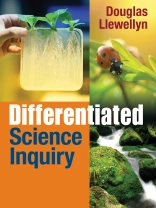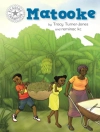‘This very readable book beautifully ties together inquiry, motivational strategies, and differentiation. With multiple examples of science lessons across disciplines, this important book provides a solid rationale for the importance of differentiated inquiry.’
—Susan B. Koba, President-Elect
National Science Education Leadership Association
‘The author relates his strategies to real-life scenarios and includes hands-on examples that are easy to implement. A must-have for any science teacher!’
—Diane Callahan, Middle School Science Teacher
Fairfield Middle School, OH
Ignite science learning with differentiated instruction
Given that each child learns differently, it makes sense that one type of science instruction does not fit all. Best-selling author Douglas Llewellyn gives teachers standards-based strategies for differentiating inquiry-based science instruction to more effectively meet the needs of all students. This book takes the concept of inquiry-based science education to a deeper level with the author′s unique model, including fresh ideas for engaging students and practical tools for differentiating inquiry instruction. The text demonstrates:
- Methods for determining when and how to provide students with more choices, thereby increasing their ownership and motivation
- Ways to implement differentiated science inquiry in the main areas of science instruction
- Strategies for successfully managing the classroom
Differentiated Science Inquiry offers compelling examples and is filled with helpful how-to′s for modifying existing activities and labs for effective instruction.
表中的内容
Preface
Acknowledgments
About the Author
Introduction
Part I. The Meaning of Inquiry: The ‘Why’ Chapters
1. Pathways to Inquiry
2. The Art and Science of Inquiry
3. Differentiated Science Inquiry
4. Why Teachers Differentiate Science Instruction
5. Motivation: The Key to Unlock Learning
Part II. The Mechanics of Inquiry: The ‘How’ Chapters
6. How to Write a Differentiated Science Inquiry Lesson
7. Differentiated Life Science Inquiries
8. Differentiated Earth Science Inquiries
9. Differentiated Physical Science Inquiries
10. Making a Commitment to Differentiated Science Inquiry
Resource A. Balls and Ramps Lesson Plan: Teacher Guide
Resource B. Balls and Ramps Lesson Plan: Student Guide
References
Index
关于作者
Douglas Llewellyn teaches science education courses at St. John Fisher College in Rochester, NY. Previously, he was the K-12 Director of Science at the Rochester City School District, a secondary school principal, and a middle school science teacher. Llewellyn is a frequent speaker at state and national conferences on inquiry- and argument-based teaching, constructivist learning, and science leadership.












